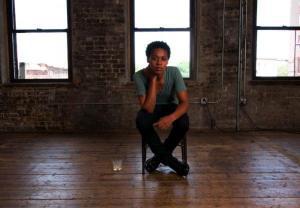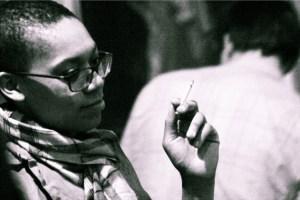On several occasions I encountered artists who preferred being called painters, instead of artists, and whenever they were called artists, their immediate was to come: “I am a painter!“
In my view, this creative minds are not principally driven by a need to make art, but by the necessity to paint in itself. For them their action is much simpler and much more complex than art. They are beings and their form of expression is painting – they ARE painting. Their way of life is an unlimited intensity in the world of being, through lines, surface and colors. This aspects of painting, as well as the smelling of oils and turpentine and repeatedly observing their works throughout the painting process is for them an inner necessity and an engine.

Krystle Warren (Photo: Jesse Blatt)
Similarly I hear Krystle Warren. Similarly I perceive her being while singing. An inner need for expression, not that I do not see her as a musician, but her singing is beyond the typical role of playing and listening to music. It is not the music, the beating waves in the air, nor the score written on sheets, what dictates her singing. Neither do they dictate her presence nor her absence on stage while performing. It is the naked need to sing, to breathe, to twitch, it is the need for love, pain, joy, passion, just existence in itself on stage, and the need for these to be physically and acoustically manifested. On stage, what dictates her presence is something different to music. It is the naked necessity to articulate her being.
And articulate she can!
I heard about this lady for the first time, during my visit to an acquaintance in Hamburg some 3 years ago, where another invited guest let us hear a couple of her videos. The first one showed a woman with great ability to involve her body in her singing. She pays great attention to the vocal expression and to the volume that her voice is able to carry, for example, while singing the song “Circles“. I have seen people that know how to execute magnificent movements of protrusion with their bodies with a certain aggressivity – like Freddy Mercury – and their voices come willingly forward with the same aggression.
There are others that sing while their bodies relax, retrieve backwards and their voices stay at ease, as if also the voice would be laying back, leaning against a wall. But in Circles I hear a tremendously relaxed voice and observe a relaxed body, however, the soul is elsewhere. The body of that soul is not at all relaxed, not at all leaning, but ever protruding, singing, at times screaming.
The second video that Alex played for us was Warrens interpretation of “Eleanor Rigby“. The video hat barely started and he warned us that the beginning was nothing spectacular, but that it would change later.
Who does not know Eleanor Rigby? We know what awaits us. It is one of the most popular ones from the Beatles. In the 1966 version for the Album “Revolver”, the instrumentation was an octet comprised of studio musicians. The members of the Beatles did not play a single instrument and McCartney sang alone. Perhaps that is the reason why the true sadness of the song does not come through. At least it never did for me. It is said that Paul was improvising on the piano and that gave birth to the idea of the song, but the lyrics about lonely people were written after the music composition had been finished. It is a text that expresses a fairly depressive loneliness with very few lines.
.
Eleanor Rigby
Ah, look at all the lonely people
Ah, look at all the lonely people
Eleanor Rigby picks up the rice in the church where a wedding has been
Lives in a dream
Waits at the window, wearing the face that she keeps in a jar by the door
Who is it for?
All the lonely people
Where do they all come from?
All the lonely people
Where do they all belong?
Father McKenzie writing the words of a sermon that no one will hear
No one comes near.
Look at him working. Darning his socks in the night when there’s nobody there
What does he care?
All the lonely people
Where do they all come from?
All the lonely people
Where do they all belong?
Eleanor Rigby died in the church and was buried along with her name
Nobody came
Father McKenzie wiping the dirt from his hands as he walks from the grave
No one was saved
All the lonely people
Where do they all come from?
All the lonely people
Where do they all belong?
.

Krystle Warren
In the Beatles version I do not perceive this oppressive atmosphere coming from the music at all. Krystle Warren takes a very different path. Her guitar playing could hardly be simpler than that. She even claims that she does not play the guitar very well and that technique is amongst the worst ones in the field. For her it is the possibility with the least complexities to be able to accompany herself. And while her accompaniment is simple without a doubt, I find it to be the right one. the right approach staying in the back, right in the role of accompaniment, right in the pairing to what she is saying with her voice. Here she begins with a laid-back and minimal rhythm, continuously striking her guitar, until she adds her voice. Not until then it is recognizable, which song she is singing. It goes gentle, with voice and play, until Father McKenzie comes. With him Warren explodes through singing and screaming. Similar to what we know from parts sung by Stevie Wonder. Like parts also in the verge of screaming by Michael Jackson. Spots where one clearly hears that he most pound his words, tones, expression, emotions, as hard as possible. But Warren shows a much more powerful desire and capability, as well as clarity for this expressing pounding. I cannot know the reason for her pounding desire, cannot know if it indeed refers to the fact that people are dying of loneliness, but her urgency is understood as such and one wishes to know immediately the reason for the dismay, for the urgency sounds with a voice of honesty. One hears no longer a song, no music, but a powerful call. And because Warren says that her music is not about herself, but about people in general, it is fair to say that this is the reason for the aggressive, pounding expression. An eruption as expression for ALL those in loneliness.
In “Circles”, “Eleanor Rigby” and other songs, besides being powerfully expressive, the voice and the body of the singer keep calm. From her come severity AND elegance, severity AND sovereignty. Imagine a single human being in the open ocean – at times floating on the surface of the water, at times deep in the deep – that with its own power, physical dexterity and a fair amount of wild movements and strain, tries to show hundreds of spectators standing along the waterfront, how she commands the waters. When Krystle Warren sings, it is as if she – floating on the surface of the water of the sees with soft tones and passages, or sunken deep with loud calls and articulations – tries to express her highs and lows with lightness, able to pronounce these well, sing them, and the waters, irrelevant of how tormentous, deep or dangerous, must allow her voice to come through.
Especially in the areas of creativity, there are plenty of individuals exposing their souls. The so called Black Singers are very often spoken of as having or being Black Souls. Here the color is of no relevance. Here a soul is speaking from all, for all – singing.
.

